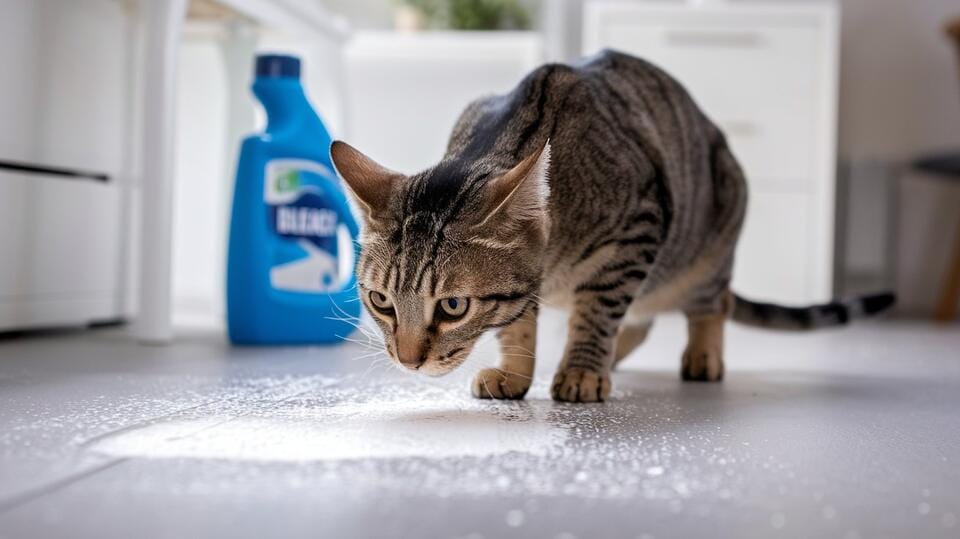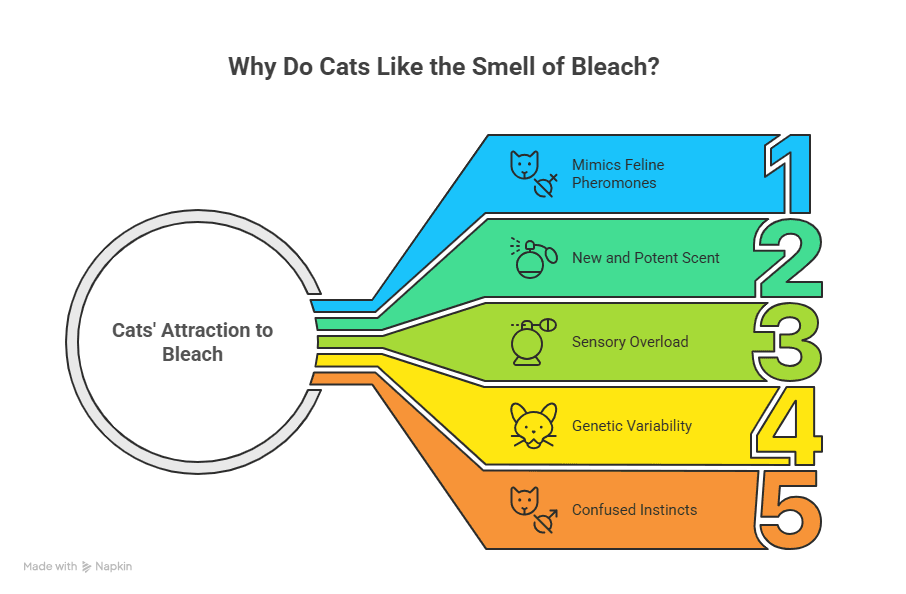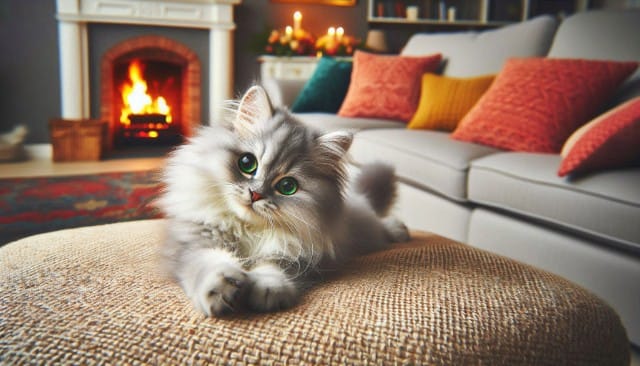
Introduction
If you’ve ever cleaned your home with bleach only to find your cat rolling, rubbing, or sniffing the spot like it’s catnip, you’re not alone.
It might seem odd, after all, bleach is a strong chemical with a sharp scent. But for some reason, many cats are absolutely fascinated by it. Some will meow, roll around excitedly, or even try to lick the area you just cleaned.
So, what gives?
Why do cats like the smell of bleach? And is it something to worry about?
In this article, we’ll explore:
- Why some cats are attracted to bleach
- What science says about their behavior
- Whether bleach is harmful to your cat
- Safer cleaning alternatives for pet parents
Let’s get to the bottom of this quirky, and potentially dangerous, feline fascination.
What Is Bleach, and Why Does It Smell So Strong?
Bleach is a household disinfectant that contains sodium hypochlorite, a powerful chemical compound used to kill bacteria, viruses, and fungi. It’s commonly used to:
- Clean floors and surfaces
- Disinfect bathrooms and kitchens
- Remove mold or mildew
- Whiten clothes and remove stains
🧪 Why Does It Smell So Intense?
Bleach has a sharp, chlorine-like scent that’s strong enough to be noticed even in diluted form. This odor is often off-putting to humans, but cats experience smells in an entirely different way.
How Cats Experience Scent
Cats have an incredibly advanced sense of smell, about 14 times stronger than humans. Their noses contain over 200 million scent receptors, compared to our 5 million.
They also possess a unique organ called the Jacobson’s organ (vomeronasal organ) located on the roof of their mouth. This allows them to analyze complex chemical signals in a behavior known as the flehmen response, that classic open-mouthed sniff.
So when a cat smells bleach, it’s not just “strong”—
It’s chemical poetry.
To some cats, bleach may mimic the pheromones naturally found in their environment, triggering instinctive behaviors like rolling, rubbing, or vocalizing.
Why Do Cats Like the Smell of Bleach? 5 Theories

There’s no one definitive answer, but here are the most widely accepted reasons:
🧠 1. Bleach Mimics Feline Pheromones
One of the strongest theories is that bleach chemically resembles certain feline pheromones, the biological compounds cats use to:
- Mark territory
- Signal mating behavior
- Create social bonds
The smell may trigger a neurological response similar to the one they experience with:
- Catnip
- Valerian root
- Silvervine
This could explain why some cats behave giddy or “high” after exposure.
🧼 2. It’s a New and Potent Scent
Cats are naturally curious, and any new, intense scent will likely grab their attention. Bleach is a foreign smell in their environment, which may lead to:
- Investigative sniffing
- Scent-marking behavior
- Curiosity-driven excitement
🧶 3. Sensory Overload
The strong chemical profile of bleach can overstimulate the cat’s scent receptors. In response, cats might:
- Meow loudly
- Roll or flop over
- Rub their cheeks or chin against the area
It’s similar to how some cats react to strong-smelling foods or plants.
🧬 4. Genetic Variability
Not all cats react to bleach the same way, just like with catnip. Studies show that sensitivity to certain chemicals is genetically inherited. Roughly 50–70% of cats respond to catnip; a similar principle may apply to bleach.
So, if only one of your cats is obsessed with bleach, it might just be in their DNA.
🚫 5. Confused Instincts
Some experts suggest that bleach may trick your cat’s brain into thinking it’s encountering:
- A potential mate’s scent
- A rival cat’s territory
- A natural environment signal
This might cause them to react in strange or seemingly inappropriate ways, like meowing, pacing, or scent-marking.
Is Bleach Dangerous for Cats? Yes, and Here’s Why
While the behavior may be amusing, bleach is not a toy or treat. It’s a strong chemical that can seriously harm your cat.
⚠️ Risks of Exposure Include:
- Burns on the paws or mouth
- Nausea and vomiting
- Drooling or foaming
- Difficulty breathing (especially with fumes)
- Neurological symptoms in extreme cases
Cats who lick bleach or walk through freshly cleaned areas may accidentally ingest the chemical while grooming themselves.
Types of Bleach and Their Toxicity
Not all bleach products are created equal. Here’s how they compare in terms of safety:
| Type of Bleach | Toxicity Level | Notes |
| Regular household bleach | High | Harmful if inhaled or ingested |
| Scented bleach | Very High | Contains extra chemicals/fragrance |
| Non-chlorine bleach | Medium | Still unsafe if ingested |
| Pet-safe cleaning products | Low | Usually enzyme-based or natural |
👉 Rule of thumb: If it smells strong to you, it’s stronger to your cat.
What To Do If Your Cat Is Attracted to Bleach
It’s not enough to just shake your head and chuckle. You’ll want to take steps to minimize risk and keep your cat safe.
✅ 1. Keep Cats Away While Cleaning
- Place them in another room
- Ventilate the area well
- Avoid letting them back until the area is dry and aired out
✅ 2. Use a Diluted Solution
If you must use bleach, dilute it:
- 1 part bleach to 10 parts water is effective for disinfecting
- Rinse cleaned surfaces afterward with clean water
✅ 3. Lock Away Bleach Products
- Store bleach and other chemicals in closed cabinets
- Use child-proof or pet-proof locks if needed
✅ 4. Observe Your Cat After Exposure
- If your cat licks or rolls in bleach, watch for symptoms:
- Drooling
- Vomiting
- Lethargy
- Paw chewing
- Drooling
- Call your vet or poison helpline immediately if anything seems off
What to Do If Your Cat Licks or Walks Through Bleach
🐾 First Aid Tips:
- Paws: Wipe with a clean, damp cloth to remove residue
- Mouth: Offer fresh water; don’t induce vomiting
- Eyes: Rinse gently with lukewarm water if there’s irritation
If symptoms persist, contact:
- Your veterinarian
- Pet Poison Helpline: (855) 764-7661 (U.S.)
Pet-Safe Alternatives to Bleach
If your cat reacts strongly to bleach, or you want a safer cleaning option, here are some alternatives:
🌿 1. White Vinegar and Baking Soda
- Natural disinfectant
- Cuts odors and breaks down grime
- Safe if used properly and rinsed
🧼 2. Enzyme Cleaners
- Designed to break down pet stains (urine, vomit, etc.)
- Great for litter box areas and floors
- Often labeled “pet-safe”
🧴 3. Plant-Based Cleaners (Unscented)
- Choose formulas labeled non-toxic or pet-safe
- Avoid products with essential oils unless approved for cats
🚫 Avoid These Common Cleaning Ingredients:
- Ammonia
- Phenol
- Pine oils
- Tea tree oil
- Artificial fragrances
Even “natural” isn’t always safe, always double-check labels.
FAQs
Is bleach like catnip for cats?
Not exactly. The response may seem similar, but it’s not the same chemical pathway. Bleach mimics pheromones, while catnip works on specific receptors in the brain.
Why does only one of my cats react to bleach?
Just like with catnip, the bleach response may be genetically influenced. Some cats are sensitive, others aren’t.
Is it dangerous for cats to walk on bleach-cleaned floors?
Yes, especially if the surface is still wet. The chemical can burn their paws or be ingested when they groom. Always let it dry completely and rinse if possible.
Are there any cleaning products that smell like bleach but are safe?
Some pet-safe cleaners have a “clean” scent, but it’s best to avoid anything strongly fragranced. When in doubt, go scent-free and rinse thoroughly.
Can bleach fumes hurt my cat over time?
Yes. Prolonged exposure to bleach fumes may irritate your cat’s lungs or eyes—especially in poorly ventilated areas.
Also Read - Why Do Cats Touch Noses? The Adorable Truth Behind This Feline Behavior
Conclusion
So, why do cats like the smell of bleach?
It’s likely due to a pheromone-like response triggered by bleach’s chemical composition. For some cats, it mimics the scent of other felines or activates instinctual behaviors, much like catnip.
But no matter how amusing your cat’s bleach obsession seems, it’s important to remember:
Bleach is a dangerous chemical, not a toy.
By understanding why your cat is drawn to it, you can take smart, safe steps to:
- Minimize exposure
- Choose safer cleaning alternatives
- Protect your cat’s health without sacrificing your home’s cleanliness
With the right precautions, you can keep your home fresh and your feline family members safe and sound.




